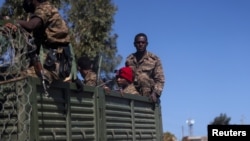The United States is pressing Ethiopia to end the conflict in its Tigray region that has been raging for almost six months. U.S. officials are also calling for allied Eritrean troops to withdraw from the region.
The United States will continue to pause non-humanitarian assistance to Ethiopia to pressure Prime Minister Abiy Ahmed’s government to do more to stop the “deteriorating humanitarian and human rights crisis,” officials said.
“The fighting must come to an end. There must be humanitarian access, which has been a problem,” the State Department’s acting Assistant Secretary for African Affairs, Robert Godec, told VOA on Monday during a briefing by phone.
“We need the human rights abuses and atrocities to stop. We need the Eritreans and the Amhara [militia] to leave. And we need, really, an end to this conflict,” Godec added.
Tuesday, Secretary of State Antony Blinken is holding virtual meetings with officials in Kenya and Nigeria, with “strengthening democratic governance” and “building lasting security” high on the agenda, State Department spokesperson Ned Price said in a statement.
The crisis in the Tigray region is “a regional issue” and “it does pose risks to the entire region,” said Godec, adding the United States is in “close communication” with other African leaders to end the dire situation.
Abiy launched what he termed a “law and order operation” in the Tigray region in November and ordered Ethiopia’s federal military to detain and disarm leaders of the Tigray People’s Liberation Front (TPLF), saying the group was responsible for inciting attacks on federal army camps. The TPLF is a political group with an armed wing vowing to continue fighting against the federal government. The TPLF held power for more than two decades under former Prime Minister Meles Zenawi.
On March 26, Abiy said Eritrea had agreed to withdraw its forces from Tigray. But U.S. officials said there is no evidence that such a withdrawal has occurred.
Monday, in a phone call to Abiy, Blinken “pressed for Ethiopia’s and Eritrea’s commitments to withdraw Eritrean troops from Tigray to be implemented immediately, in full, and in a verifiable manner,” said the State Department.
The newly appointed U.S. special envoy for the Horn of Africa, Jeffrey Feltman, is expected to travel to Ethiopia in the coming days.
On Monday, a State Department spokesperson told VOA the United States will continue its non-humanitarian “assistance pause” to Ethiopia but keep the humanitarian aid to the country.
“Given the current environment in Ethiopia, we have decided not to lift the assistance pause for other programs, including most programs in the security sector,” said the spokesperson.
The United States had suspended certain foreign assistance to Ethiopia last year following the country’s failure to resolve the dispute with Egypt over the Grand Ethiopian Renaissance Dam (GERD.)
But the State Department said Washington will continue humanitarian assistance to Ethiopia, and is committed to building “an enduring partnership with the Ethiopian people and to the territorial integrity and national unity of Ethiopia.”
The armed conflict in Tigray has resulted in thousands of deaths and displaced thousands more inside the country. Hundreds of thousands have also been forced to flee to neighboring Sudan. The Tigray region of more than 5 million people is facing shortages of food, water and medicine, according to the United Nations.
The United States is the largest donor of humanitarian assistance in Ethiopia. For the Tigray response efforts only, the U.S. has provided nearly $305 million in humanitarian aid to alleviate the suffering of people in need.
Tuesday, Blinken will embark on his first virtual trip to Africa as the top U.S. diplomat. He will meet with Young African Leadership Initiative, or YALI, alumni and discuss a range of topics, including economic development, democracy and good governance, climate change, and health.
The chief U.S. diplomat will then meet virtually with Nigerian President Muhammadu Buhari and Foreign Minister Geoffrey Onyeama to underscore shared goals of strengthening democratic governance, building lasting security, and promoting economic ties and diversification.
Blinken’s meeting with Kenyan officials will celebrate the 57-year bilateral relationship. He will meet with President Uhuru Kenyatta and Cabinet Secretary Raychelle Omamo to reaffirm the strategic partnership and explore avenues to address the COVID-19 pandemic.








